Head over to the Carbon Reduction Visualizer to explore data on Georgia’s greenhouse gas emissions. You can see how emissions fall if we scale solutions to ambitious, but achievable, levels.
Transportation

Here’s the deal
Georgia has nearly 90,000 miles of public roads. In 2021, vehicles accounted for about 41% of the state’s GHG emissions -- our single largest source. Switching out gasoline and diesel-powered vehicles for electric vehicles, increasing mass transit, and adopting more alternative transportation options will help us dramatically reduce these emissions.

Mass Transit
Mass...
When people live where it’s easy to take the bus, the train or a streetcar, it reduces emissions. Growth in mass transit ridership across the state could reduce emissions by 1 million metric tons if we locate 320,000 additional households in Transit Oriented Developments by 2030.
Electric
Vehicles
Elec...
Electric vehicles produce fewer emissions - especially as Georgia’s electricity becomes low-carbon. Putting more electric vehicles on the road while retiring older conventional models could reduce emissions by 1 million metric tons if we replaced 250,000 gasoline-powered vehicles with electric vehicles by 2030.
Energy-Efficient
Cars
Ener...
Energy efficient cars are engineered to have better fuel economy, or operate as a hybrid (gas and electric). Putting more energy efficient cars on the road could reduce emissions by 1 million metric tons if new cars purchased in Georgia were at least 3% more fuel efficient than they are today by 2030.
Energy-Efficient
Trucks
Ener...
Reducing the diesel fuel consumption from the 400,000 registered medium and heavy duty trucks in Georgia comes from increasing fuel efficiency in Georgia’s truck fleet as well as smarter routing to reduce vehicle miles driven overall. If we reduce diesel fuel use in medium duty and heavy duty trucks by 10%, we could reduce emissions by 1 million metric tons by 2030.
Alternative
Transportation
Alte...
Increasing low- and zero-carbon alternatives to car trips is a no-brainer but it’s not always easy to bike, walk, or scooter to your destination. We can build supportive infrastructure like safe bike paths, and increase opportunities for teleworking post-COVID. We could reduce emissions by 1 million metric tons if we eliminate 2.5% of our vehicle miles traveled by 2030.
Mass Transit
When people live where it’s easy to take the bus, the train or a streetcar, it reduces emissions. Growth in mass transit ridership across the state could reduce emissions by 1 million metric tons if we locate 320,000 additional households in Transit Oriented Developments by 2030.
Electric Vehicles
Electric vehicles produce fewer emissions - especially as Georgia’s electricity becomes low-carbon. Putting more electric vehicles on the road while retiring older conventional models could reduce emissions by 1 million metric tons if we replaced 250,000 gasoline-powered vehicles with electric vehicles by 2030.
Energy-Efficient Cars
Energy efficient cars are engineered to have better fuel economy, or operate as a hybrid (gas and electric). Putting more energy efficient cars on the road could reduce emissions by 1 million metric tons if new cars purchased in Georgia were at least 3% more fuel efficient than they are today by 2030.
Energy-Efficient Trucks
Reducing the diesel fuel consumption from the 4 million registered medium and heavy duty trucks in Georgia comes from increasing fuel efficiency in Georgia’s truck fleet as well as smarter routing to reduce vehicle miles driven overall. If we reduce diesel fuel use in medium duty and heavy duty trucks by 10%, we could reduce emissions by 1 million metric tons by 2030.
Alternative Transportation
Increasing low- and zero-carbon alternatives to car trips is a no-brainer but it’s not always easy to bike, walk, or scooter to your destination. We can build supportive infrastructure like safe bike paths, and increase opportunities for teleworking post-COVID. We could reduce emissions by 1 million metric tons if we eliminate 2.5% of our car trips by 2030.
Here’s where we are
More and more Georgians are going electric. According to the U.S. Department of Energy, electric vehicle registrations have increased in Georgia. In 2021, there were about 34,000 EVs registered in the state. But, there’s still a long way to go. This number represents about 0.4% of all registered vehicles in the state.

Here’s where we are
Frequently Asked Questions
Can you really bike or walk to work in Georgia?
In metro Atlanta, we already have approximately 600 miles of marked and/or protected bike lanes, multi-use paths, and “sharrow” streets, which are painted to indicate shared use for bikes and cars. When these urban solutions are combined with other alternatives like buses, rail lines, and carpools, walking and biking can absolutely play a role in helping to reduce the number of cars on Georgia roads.
Why are energy-efficient cars and trucks an important climate solution?
CO2 emissions are (nearly linearly) correlated to vehicle size and weight. In Georgia, the share of the light duty vehicle fleet that is comprised of larger vehicles (light trucks and SUVs) is about 60% compared to a national average share of about 45%.



